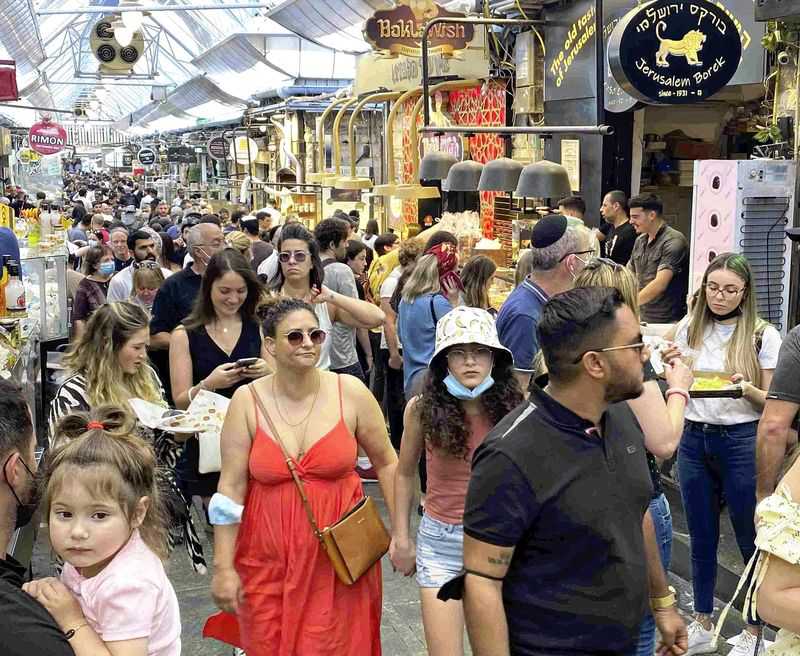Israel regaining normality as outdoor mask mandate lifted, but concerns remain
29 April, 2021

Israel is time for active daily life following its government lifted the outdoor mask mandate before many other countries in the world.
Novel coronavirus vaccinations were rolled out in Israel at the world’s most effective pace, but inoculations have slowed recently, and infections with a fresh variant are also confirmed in the united states. Ahead of a well planned reopening to foreign tourists, some have voiced concerns about persons letting their guard down against the virus.
The Machane Yehuda market in Jerusalem was crowded with shoppers on Friday, the first weekend after people were no longer required to wear masks outdoors. Popular among local residents, the marketplace was so busy that visitors were shoulder to shoulder, but few persons were wearing masks. Shopkeepers were hawking their wares, and all of the restaurants and bars on the market were packed.
A 62-year-old man who visited the marketplace along with his wife said he previously a hard time breathing with masks due to chronic respiratory disease. Although he was a little nervous about removing his mask, he said with a smile that he was happy to manage to breathe and fill his lungs with oxygen.
Israeli Health Minister Yuli Edelstein declared on April 15 that the country’s vaccination campaign have been successful and announced the easing of restrictions on wearing masks outdoors, effective April 18.
Israel in February introduced the Green Pass vaccination certificate that allows inoculated people to consume inside restaurants and visit concert halls, hotels and other establishments.
Wearing masks outdoors is no more necessary largely because of the steady progress of vaccinations. Inoculations commenced in late December, and 54% of Israel’s population has recently received two doses of COVID-19 vaccine.
Recently, the quantity of new infections has been hovering around 100 per day, a sharp decrease to one-hundredth of the quantity recorded through the peak in January.
On April 22, the united states recorded no deaths from the virus for the very first time in about 10 months since June this past year.
■ Vaccinations slowing
However, the vaccination rollout, which had been progressing steadily, has come to a standstill. In mid-January, a lot more than 200,000 persons a day were vaccinated, but now the number is only about 10,000 people. This is thought to be because people worried about unwanted effects are hesitant to get inoculations, and the amount of vaccination sites has been reduced.
Furthermore, the major Israeli newspaper Haaretz and others in February reported the results of a domestic study showing an 85% reduced amount of symptomatic COVID-19 after an individual dose of the vaccine made by U.S. pharmaceutical giant Pfizer Inc. The second shot may cause more robust reactions occasionally, likely prompting many persons to forgo the second inoculation.
It is said that if about 70% of the population are vaccinated, herd immunity may be accomplished, but at the moment, the inoculation rate is below 60%.
Schools fully resumed on April 18. There is a opportunity that the virus could spread among children who have not been vaccinated.
Taking this into consideration, the Israeli government plans to launch a fresh vaccination campaign within half a year, expanding the range of people eligible for vaccination to include children between the ages of 12 and 15 to be able to achieve herd immunity.
According to Pfizer, the vaccine is expected to remain effective for at least six months. For some persons in Israel, half a year will have passed in July since they got the next shot, prompting the federal government to consider additional vaccinations.
■ Caution over new variants
New variants first identified in India and other countries are also a cause for concern. Seven infections with the Indian variant have been completely confirmed in Israel. The “double mutant” variant is thought to be highly infectious, and the number of infections has been skyrocketing in India.
Israel will begin accepting tourists from beyond your country in May for the first time in 14 months. Tourists will be limited by vaccinated persons traveling in groups.
Although tourists from India will never be included, people infected with the Indian variant have already been confirmed in many other countries. Vaccines are believed to be less effective against it, and there are fears it may cause another surge in infections.
Some persons in Israel are optimistic about the coronavirus, describing it as something during the past and saying they are free from it. However, Nachman Ash, who's responsible for the Israeli government’s measures against the pandemic, on Sunday urged people to remain vigilant, stressing that the pandemic is not over yet.
Source: the-japan-news.com
TAG(s):
